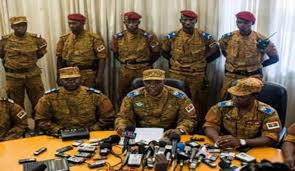Lieutenant Colonel Paul-Henri Damiba, Burkina Faso’s new military leader, stated on Thursday that the West African country will return to constitutional order when the conditions are right.
Damiba spoke on national television for the first time since spearheading the rebellion that toppled President Roch Marc Kabore on Monday.
“I commit to a restoration to a regular constitutional system when the conditions are right, according to the date that our people will define in all sovereignty,” Damiba stated.
Damiba, who was dressed in a red beret and army fatigues and accompanied by national flags, said he will meet diverse elements of Burkina Faso’s society to agree on a path for planning and implementing required reforms.
The junta announced on Monday that it would present a timetable for restoring constitutional order “within a realistic time period” after seizing power, but it has not expanded on its plans.
The officers, who name themselves the Patriotic Movement for Safeguard and Restoration (MPSR), staged a mutiny on Sunday night and had Kabore removed the next day, accusing him of failing to stop Islamist terrorists from increasing their assaults.
Damiba told farmers, herders, and residents in the Sahel region of West Africa who had been displaced by terrorists linked to al Qaeda and Islamic State that he would reclaim control of those areas. Security, he stated, would be a top priority.
Damiba’s remarks came ahead of an emergency meeting of the 15-member Economic Community of West African States (ECOWAS) scheduled on Friday to decide how to respond to the coup.
Following military takeovers in August 2020 and September 2021, ECOWAS placed sanctions on Burkina Faso’s neighbors Mali and Guinea.
This new coup in West and Central Africa comes amid an increasingly deadly Islamist insurgency in the Sahel area, which has killed thousands and displaced millions, weakening trust in democratic authorities to address the problem.
Military juntas in Mali and Guinea, as well as the Central African nation of Chad, where the military seized power in April 2021, have all established transitional governments with a mix of military and civilian officials.
Mali and Chad’s juntas agreed to 18-month transitions to democratic elections, while Guinea’s has yet to set a date.
Malian officials, on the other hand, have reneged on their initial agreement and now proposing to postpone elections that were set to take place next month by up to four years.




















